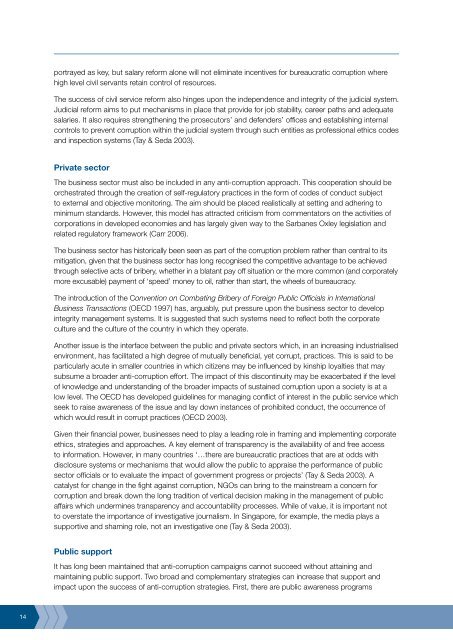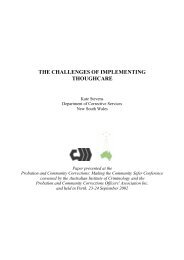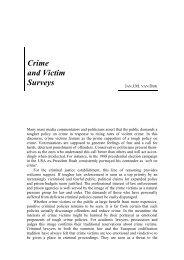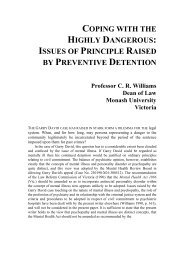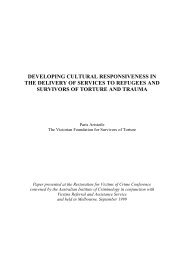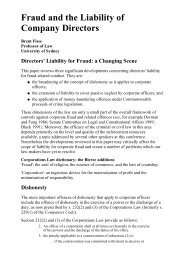Review of anti-corruption strategies Rob McCusker - Australian ...
Review of anti-corruption strategies Rob McCusker - Australian ...
Review of anti-corruption strategies Rob McCusker - Australian ...
Create successful ePaper yourself
Turn your PDF publications into a flip-book with our unique Google optimized e-Paper software.
portrayed as key, but salary reform alone will not eliminate incentives for bureaucratic <strong>corruption</strong> where<br />
high level civil servants retain control <strong>of</strong> resources.<br />
The success <strong>of</strong> civil service reform also hinges upon the independence and integrity <strong>of</strong> the judicial system.<br />
Judicial reform aims to put mechanisms in place that provide for job stability, career paths and adequate<br />
salaries. It also requires strengthening the prosecutors’ and defenders’ <strong>of</strong>fices and establishing internal<br />
controls to prevent <strong>corruption</strong> within the judicial system through such entities as pr<strong>of</strong>essional ethics codes<br />
and inspection systems (Tay & Seda 2003).<br />
Private sector<br />
The business sector must also be included in any <strong>anti</strong>-<strong>corruption</strong> approach. This cooperation should be<br />
orchestrated through the creation <strong>of</strong> self-regulatory practices in the form <strong>of</strong> codes <strong>of</strong> conduct subject<br />
to external and objective monitoring. The aim should be placed realistically at setting and adhering to<br />
minimum standards. However, this model has attracted criticism from commentators on the activities <strong>of</strong><br />
corporations in developed economies and has largely given way to the Sarbanes Oxley legislation and<br />
related regulatory framework (Carr 2006).<br />
The business sector has historically been seen as part <strong>of</strong> the <strong>corruption</strong> problem rather than central to its<br />
mitigation, given that the business sector has long recognised the competitive advantage to be achieved<br />
through selective acts <strong>of</strong> bribery, whether in a blatant pay <strong>of</strong>f situation or the more common (and corporately<br />
more excusable) payment <strong>of</strong> ‘speed’ money to oil, rather than start, the wheels <strong>of</strong> bureaucracy.<br />
The introduction <strong>of</strong> the Convention on Combating Bribery <strong>of</strong> Foreign Public Officials in International<br />
Business Transactions (OECD 1997) has, arguably, put pressure upon the business sector to develop<br />
integrity management systems. It is suggested that such systems need to reflect both the corporate<br />
culture and the culture <strong>of</strong> the country in which they operate.<br />
Another issue is the interface between the public and private sectors which, in an increasing industrialised<br />
environment, has facilitated a high degree <strong>of</strong> mutually beneficial, yet corrupt, practices. This is said to be<br />
particularly acute in smaller countries in which citizens may be influenced by kinship loyalties that may<br />
subsume a broader <strong>anti</strong>-<strong>corruption</strong> effort. The impact <strong>of</strong> this discontinuity may be exacerbated if the level<br />
<strong>of</strong> knowledge and understanding <strong>of</strong> the broader impacts <strong>of</strong> sustained <strong>corruption</strong> upon a society is at a<br />
low level. The OECD has developed guidelines for managing conflict <strong>of</strong> interest in the public service which<br />
seek to raise awareness <strong>of</strong> the issue and lay down instances <strong>of</strong> prohibited conduct, the occurrence <strong>of</strong><br />
which would result in corrupt practices (OECD 2003).<br />
Given their financial power, businesses need to play a leading role in framing and implementing corporate<br />
ethics, <strong>strategies</strong> and approaches. A key element <strong>of</strong> transparency is the availability <strong>of</strong> and free access<br />
to information. However, in many countries ‘…there are bureaucratic practices that are at odds with<br />
disclosure systems or mechanisms that would allow the public to appraise the performance <strong>of</strong> public<br />
sector <strong>of</strong>ficials or to evaluate the impact <strong>of</strong> government progress or projects’ (Tay & Seda 2003). A<br />
catalyst for change in the fight against <strong>corruption</strong>, NGOs can bring to the mainstream a concern for<br />
<strong>corruption</strong> and break down the long tradition <strong>of</strong> vertical decision making in the management <strong>of</strong> public<br />
affairs which undermines transparency and accountability processes. While <strong>of</strong> value, it is important not<br />
to overstate the importance <strong>of</strong> investigative journalism. In Singapore, for example, the media plays a<br />
supportive and shaming role, not an investigative one (Tay & Seda 2003).<br />
Public support<br />
It has long been maintained that <strong>anti</strong>-<strong>corruption</strong> campaigns cannot succeed without attaining and<br />
maintaining public support. Two broad and complementary <strong>strategies</strong> can increase that support and<br />
impact upon the success <strong>of</strong> <strong>anti</strong>-<strong>corruption</strong> <strong>strategies</strong>. First, there are public awareness programs


